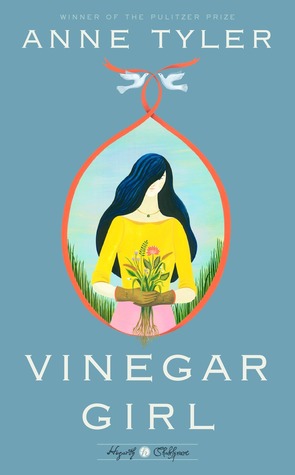“In my country they have a proverb: 'Beware against the sweet person, for sugar has no nutrition'.”Having really enjoyed Howard Jacobson's Shylock Is My Name, I thought that I was going to love the whole Hogarth Shakespeare series, but now with Anne Tyler's Vinegar Girl, only my second foray into the series, I have to say I'm disappointed: this one really didn't work and I think it's because The Taming of the Shrew is too hard to update to our modern times. I'll be specific, so spoilers beyond...
This was intriguing. Kate said, “Well, in my country they say that you can catch more flies with honey than with vinegar.”
“Yes, they would,” Pyotr said, mysteriously...“But why you would want to catch flies, hah? Answer me that, vinegar girl.”
A brief recap of Shrew: Baptista won't allow his (universally beloved) daughter Bianca to marry one of her many suitors until her (universally despised) older sister Katherine is married first. Along comes an immoral gold-digger named Petruchio who offers to take Katherine off her father's hands, the pair are married, and after many days of depriving her of food and sleep and the ability to choose her own clothes – at the point where Katherine is willing to declare the sun is the moon if it allows her to eat and rest – they return for Bianca's wedding feast, where Katherine gives a speech on the importance of wives obeying their husbands, and all live happily ever after.
How to make that work in 2016?
Whereas Katherine in the original was a strong, sharp-tongued woman who speaks her mind and loves verbal jousting, our Kate is now a twenty-nine-year-old assistant teacher at a preschool (a job she loathes) whose main claim to snappy repartee is getting into did-not-did-too-did-not arguments with four-year-olds. She's sullen as a teenager at work (talking back to parents and supervisors), and at home, she meekly does all of the housework according her immunologist father's “scientific” plans while her trashy little sister entertains boys in the living room. When her father asks Kate to enter a marriage of convenience with his Russian lab assistant who is about to be deported, she at first balks, but soon relents. I was totally not impressed with Kate by this point, but the circumstance of the grudging marriage was a clever solution.
As in the play, the groom is late for the wedding, and although Pyotr shows up testy and acting rude (for good reason, but still, Kate is doing him the favour here...), she goes through with the wedding and rides along back to his apartment with him, where Kate watches him act horribly towards his landlady's caregiver. Pyotr still has matters to attend to, so he buggers off, while Kate finds nothing to eat, and as there are no sheets on her bed, she has an uncomfortable nap on a hard chair (so much like the original!). When Pyotr returns late to bring Kate to the wedding dinner at her aunt's house, he tells her she has no time to change (so controlling, just like in the original!), and when Kate's little sister attacks Pyotr during dinner (for what is actually a pretty good reason), Kate stands up and gives a moving speech about how hard men have it in the modern world – always expected to swallow their negative feelings and act strong – and she thinks everyone should just give Pyotr a break. Happily ever after? Yes: according to the epilogue, Kate quits the job she hates, goes back to college to get a botany degree, and eleven years later, has an adorable son (hey! Kate doesn't hate all kids after all), a happy marriage, and is off to accept a professional award.
At first, I thought that the meeting of Kate and Pyotr would feature a Tracy/Hepburn, Bogie/Bacall, Katherine/Petruchio level of verbal jousting, but this was about as good as it got:
“In my country they have a proverb,” Pyotr was saying.So, the best part of the original play (Katherine finally meeting a man who could match her poison tongue) wasn't really used, Kate was pretty unlikeable, and Pyotr was a very nice man who didn't aspire to “tame” anyone. And then the wedding happened and Pytor started acting like a jerk and that's when Kate falls for him. I don't get it. What worked about Shylock Is My Name is that Jacobson used The Merchant of Venice as a framing structure for a thoroughly modern story. What doesn't work about Vinegar Girl is that it is neither entirely faithful to the original (a tale of abuse that, naturally, no one wants to see today) nor entirely modern: I have no idea who this Kate was or why she put up with the life she hates at the beginning or why she decides she's in love with a man when he is acting at his worst. Shrug. I like Anne Tyler: maybe she should have chosen a different Shakespeare.
Didn't they always, Kate thought.
“We say, 'Work when it is divided into segments is shorter total period of time than work when it is all together in one unit.'”
“Catchy,” Kate said.
I've seen plenty of Shakespeare but I've never seen The Taming of the Shrew, and this is probably why: who wants to see this story? In order to get an idea of what the source material was like, I watched some YouTube videos, and this was my favourite:
And that led me to look into the Broadway show/film Kiss Me Kate, and as it features a poster with a man actually spanking a grownup woman, I'm glad I've never seen that either:
*****
Books in the Hogarth Shakespeare series:
Shylock is My Name
Vinegar Girl
The Gap of Time
Hag-Seed
New Boy
Dunbar
Macbeth
And Related:
Nutshell


